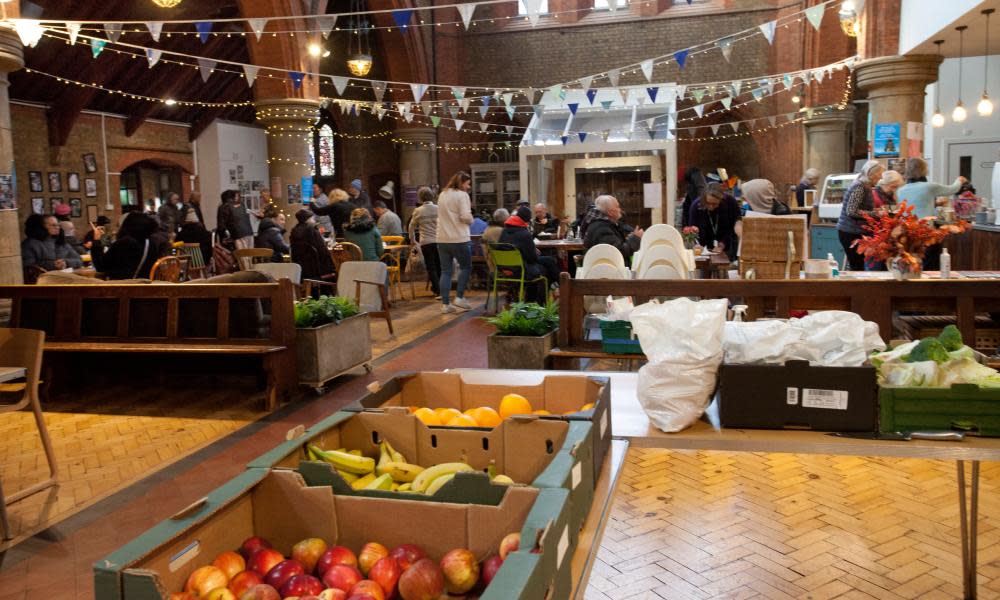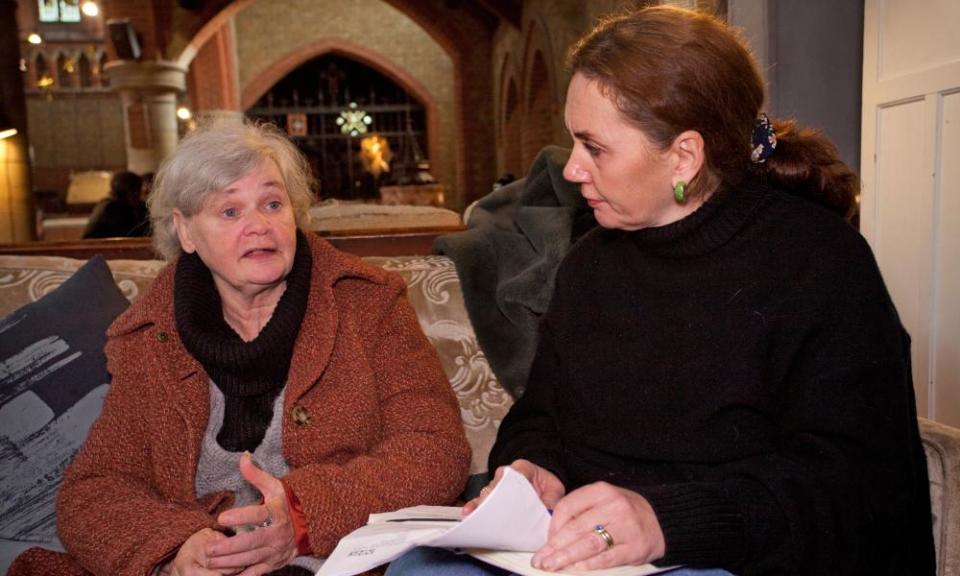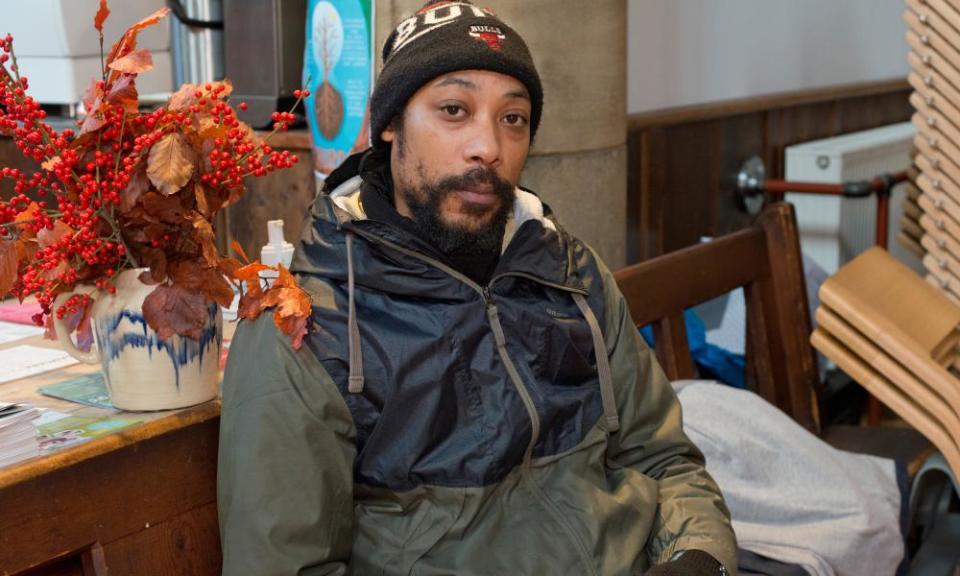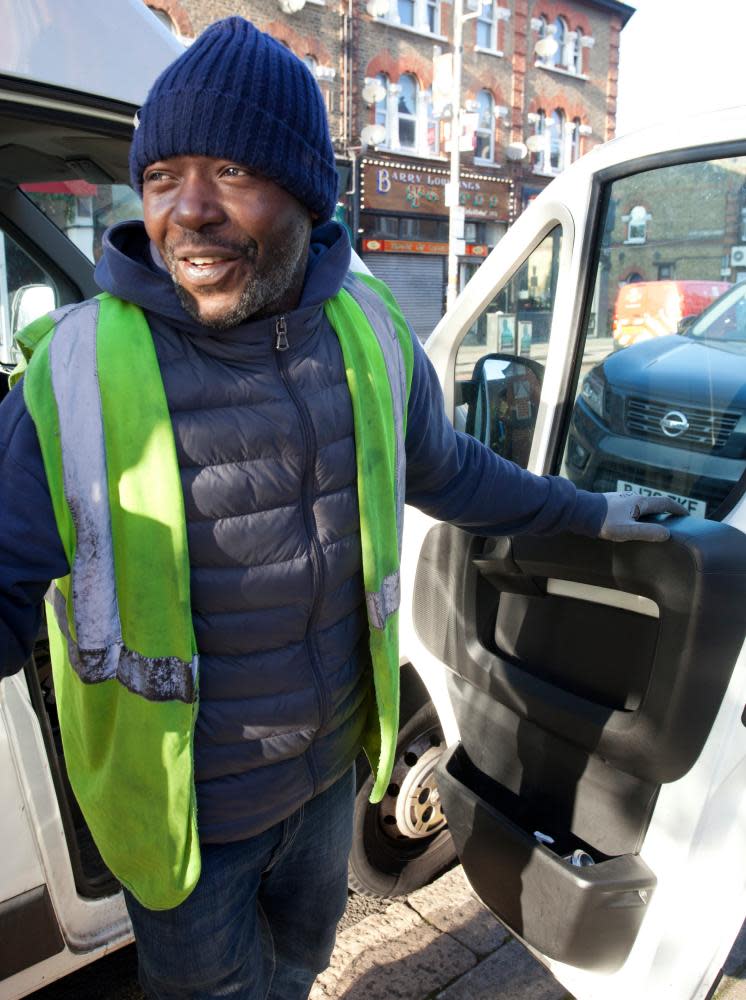Food bank Britain: five months on the frontline of the new emergency service

Four pounds for an entire month. That was all Paul Taylor, 53, had been left with. He had already been skipping meals to feed his two daughters, nine and 13, but now he was faced with the impossible. Four pounds to cover all his family’s living costs for more than four weeks, including rent, gas, electricity, food and transport. Almost exactly a decade after they were first introduced by David Cameron’s coalition government, Taylor was feeling the full cruel force of benefit sanctions.
Today, arriving at Earlsfield Foodbank in south-west London, he hasn’t eaten for several days. “I’m right down there at the moment,” he says, reaching towards his feet to indicate how low he feels, “but just got to put on a brave face and not show it.” His last meal was given to him by a neighbour, who also helps him out with childcare and often lends him money for food. Taylor is not worried about himself, as long as the girls are looked after.
Staring at his laptop in a beanie hat and fleece, a neat folder of bills slotted into plastic wallets, a mobile phone and a cup of tea by his side, he says: “I want to know, who do I complain to about sanction of benefits?” He received no letter informing him of the decision, he says, and believes the action was punishment for a missed appointment earlier in the year.

Taylor, an Earlsfield regular, is one of 160 households who used the food bank last month. The redbrick building of St Andrew’s church lies on the main road running through Earlsfield, a relatively affluent area of the London borough of Wandsworth, dotted with high-end delis, artisan coffee shops, multimillion-pound properties and designer buggies. Not far away is the newly renovated Battersea power station opened to great fanfare, home to dozens of luxury shops and the flashy new developments of Nine Elms. But many in the neighbourhood are struggling with basic essentials.
Nationally, between April and September, more than 320,000 people used Trussell Trust food banks for the first time and 1.3m food parcels were distributed. Almost all Independent Food Aid Network (Ifan) members reported an increase in demand between October 2021 – when the universal credit uplift was removed – and July, with more increases from August to October.

Like communities across Britain, people in Earlsfield are facing an unprecedented struggle to meet basic living costs – many going without food, heat and electricity. In recent months, on Thursday mornings, a queue forms outside the church from as early as 7am for the weekly food bank. Its clientele, some of whom walk for as long as two hours to get there, includes new mothers and babies, pensioners, the unemployed, the homeless, people who are disabled, Ukrainian refugees and those who, despite having jobs, still cannot make ends meet.
Food is only the beginning. Each week relentlessly positive music pumps from speakers, cooked breakfast is served, warm advice and counselling – and emergency crisis assistance – offered. I started speaking to its manager, Charlotte White, nearly a year ago as the cost of living crisis started to set in. Since then, despite Wandsworth falling under Labour control in May for the first time in over four decades, the problem has only worsened. In November they distributed 343 food parcels, compared with 252 in February.
I’m laughing but that’s the only other alternative from crying
Ade, Wandsworth resident
In August, when I started regularly visiting Earlsfield, with the energy crisis mounting and food inflation soaring, it was clear that the coming months would bring significant pain. But following the lives of those who depend on it across the last five months – a period that has seen three prime ministers, four chancellors and a new monarch – showed how crisis at the top has only compounded those struggles, creating confusion and, in the worst cases, putting people’s health in danger and lives at risk.
People told of their fears for the winter, how cost of living stresses had contributed to depression and suicidal thoughts, and many, including the elderly, said having to restrict food was affecting their health. Most said they would struggle to make further cutbacks, while many on prepayment meters said they were still having problems getting government assistance with their energy bills.

August
I meet Taylor during my first visit to the food bank in August. It usually goes quiet in the summer months, but this year that hasn’t happened. While the Tory leadership contest rumbles on following Boris Johnson’s resignation last month, here people are far more concerned about prices – and are already looking ahead to winter and the October energy price rise. It was recently predicted that two-thirds of all UK households would be stuck in fuel poverty by the new year, while inflation is at a 40-year high.
People chat with friends, or strike up conversations with strangers. Others sit in silence. White, who runs a team of more than 60 volunteers, seems to know everyone, greeting them cheerily by name as they arrive.
Wearing a reflective work vest, Ade says the state of British politics reminds him of the George Orwell fable Animal Farm. “It’s just a reflection of how un-in-touch the leaders are from reality.” Recent reports of Liz Truss claiming that British workers needed “more graft” are unfounded, says the delivery driver. “It’s not the people, it’s the system.”
It’s very striking how many people say they’re hungry and haven’t eaten and are not eating because of their children
Charlotte White, food bank manager
Ade is one of a growing number of people in employment who have been forced to resort to food banks because of rising costs. The 44-year-old, who lives alone in shared accommodation in Wandsworth, said he cannot even think about getting his own place. “I’m laughing but that’s the only other alternative from crying,” he says before heading back to work.
Food and energy costs are already dramatically changing cooking habits. An 81-year-old pensioner says cooking Iranian dishes in the morning used to give her a sense of purpose. Now, she says, “I cannot afford to cook.” She started coming to the food bank nearly two months ago. Wiping away tears, she describes losing her husband, who had Alzheimer’s.
Holding her queue number (guests are given a number when they arrive that is called out when it’s time to choose their food), she says putting on makeup, going out and being around others helps her to feel better.

An older woman in a rain jacket sitting alone at a table tells me she is “too ashamed to look at anyone”, averting her eyes. A young man, who looks like a child but tells me he is soon going to university, sits alone wearing a face mask and a cap. His family can’t afford to go shopping and rely mostly on food banks.
Usually breakfast is served at the food bank in an area laid out like a restaurant, bunting and fairylights draped above, but currently on a summer break. A man has fallen asleep in a sofa, his head resting on a pillar, a wheeled suitcase next to him.
Taylor, who walks here and back from his flat in Roehampton to save money, has been coming to the food bank for about a year, he says, after he was advised to go there when he sought help for an alcohol problem. He was sanctioned then, too. Next month he’s starting a Restart course.
The following week, Annmarie, 50, says trying to meet the growing needs of her two 13-year-old children has been a struggle during the summer holidays. The pain of not being able to give them what they want, she says, feels “like an alarm”.
Yesterday she went to the supermarket and was shocked by how high the prices were. “But I’m wondering: Why? Why? Why? Why all of a sudden has it gone up so much?”
Two years ago in August the food bank had an average of 35 guests. This year they’ve had 80-85 per week and have seen more families with children. “It’s very striking how many people say they’re hungry and haven’t eaten and are not eating because of their children,” says White. “We used to get that rarely, but now…” Over the next couple of months, she is expecting them to be overwhelmed.

September
Guests are reaching crisis point far quicker now, says White. She has never seen anything like it. Meanwhile, the arrival of Liz Truss as PM and the death of the Queen lead to political and constitutional upheaval. The government announces energy help in the form of the energy price guarantee, but many at Earlsfield say that the cap, which would lead to an average bill of £2,500 a year, is little comfort.
A week into September, Elaine Dinnick, who has just turned 66, is in crisis before the doors have even opened after not getting her first state pension payment. She has no funds until 20 September. White helps her with grant applications and asks how much she can carry in her brightly patterned shopping trolley.
Dinnick sits tense but still in a long checked coat, her blue eyes glassy with tears and her earrings glittering. She is overwhelmed with pressures. She lives alone, hasn’t had gas for three years, her electric is about to go, and she is walking everywhere because she has lost her bus pass – despite her osteopenia. Yesterday she walked two hours to church in the rain and has had a letter from a phone company claiming she owes them £500.

“I’m in that situation where I don’t know where to turn. Money wise, I can’t even buy…” she says breaking off. “Someone gave me an Oyster card but I’m not in a situation where I can put money on to use it.”
The government, she says, does not have the right priorities and is “doing it all wrong”. Truss’s energy price cap should be far lower, otherwise, she warns, “what’s going to happen is the elderly and vulnerable are going to be dying”. With health issues and no heating, she fears she will not survive this winter.
When, at 9.30am, doors open, people start coming in and there’s a queue out of the gate. Volunteers are packing bags and the kitchen is in full swing cooking breakfasts. Under the pulpit are stacks of cereals. Tables are piled with loaves of bread, orange juice, eggs, fruit and veg.

Trevor Howell, 52, is visiting for the third time after medical issues stopped him from working in antique restoration. He has had prostate cancer, three heart attacks and has problems in his back and knee. He has had to halve his baths, which are therapeutic for his health, and turns off his washing machine and cooker from the mains. He avoids turning on lights until 7-8pm. He eats cold tuna salads or sandwiches, using tuna from the food bank, and avoids cooking vegetables such as potatoes. Truss should have capped energy at the current cost, he says. “I’m worried for some people, for a lot actually. And myself.”
In central London, a miles-long queue has formed for the Queen’s lying in state along the banks of the Thames. Meanwhile, new chancellor Kwasi Kwarteng is expected to scrap the cap on bankers’ bonuses in next week’s mini-budget.
There is no social network. This food bank is probably people’s only social network
Odaine Rochester, food bank guest
Ade says the nation is in unknown territory, in a state of limbo that he compares to being “in halftime”. While he welcomes help on energy costs, more needs to be done before it’s too late. Inaction is costing lives, he says.
A week after Dinnick raised her pension issues, she still hasn’t received any money. She hasn’t eaten for a couple of days and is feeling tired and unwell.
Odaine Rochester, 36, has been coming to the food bank for about a month so that he has more money to pay energy bills. The father, who lives with his mother, says the government should take the issue more seriously. “It’s going to be a big problem because we’re going to have a society of people that don’t have electric on. It’s a big thing when people are protesting in the streets saying to withhold the bills in protest.”
To tackle inequality there should be more guidance and help for those who are struggling, he says. The erosion of community is also an issue. “There is no social network. This food bank is probably people’s only social network.”
As September progresses, problems with issues including mental health, debt and loan sharks are building, and breakfast, provided by Home Community Cafe at the church, hits full capacity. While they can double their numbers in terms of food bags, space for more people to eat on site is a challenge.
After several intense weeks, White has taken a day off. Lisa Davis, a food bank manager volunteer who works part-time for an investment bank, says they have had two record weeks and unusually high numbers of new people coming. “I don’t know what we’ll be facing in the next two hours,” she says. Within five minutes of opening she has already been inundated.
Rochester, who registered at the library yesterday, is trying to work out what to do next. “I’m just trying to bring myself back together, because I had a lot of slips, pitfalls, so I’m trying to stabilise it,” he says.
Jaya Gukathasan, 69, from Tooting, says everyone is talking about rising prices. “Whoever I talk to, they complain. I come on the bus, they’re talking about cost of living, that’s all they talk about, nothing else.”
While Truss is eviscerated on BBC local radio stations as she talks for the first time since the disastrous mini-budget that sent the UK economy tanking, Gukathasan says she and her son can’t afford a McDonald’s coffee.
October
While Truss attempts to restore her prime ministerial career in a defiant Conservative party conference speech, the food bank is grappling with the soaring price of instant mash. The meal, popular with elderly guests as it only needs a kettle to make, has doubled in price so they’ll have to cut it, says White. Washing-up liquid and cooking oil have also shot up.
Emma Gilbert, both a food bank volunteer and a guest, says her husband recently got a part-time retail job, which will have an impact on their universal credit. Once they’ve paid all their monthly bills, the couple, who have two teenage daughters, are left with hardly anything.
The former childcare worker, who is searching for a job in retail or cleaning, says every morning her daughter, who is doing her A-levels, asks whether there’s enough electricity to charge her phone. They now have £11 of credit for the next two weeks. Forty pounds used to last an entire month; now it is disappearing much faster.

Last Christmas was terrible, she says, and she expects this one to be even harder. It makes her angry that she can’t afford the presents her daughters have asked for. But she tries to be positive. “You have to really, for the sake of the children mainly … what can you do?”
A quiet and withdrawn man comes in saying the rising cost of living is making him ill. He has not received any money for five months after his rent went up. The situation is contributing to his depression, he says, and he has been having suicidal thoughts. “I can’t live like this any more.” White has arranged for him to speak to somebody at the food bank about his issues. He tends to “bottle everything up,” he says, especially after his father died.
Faiza Shazad, 37, is at the food bank for the first time. She is caring for her husband, who has stage four lupus, and her child, who has autism. The family recently moved from Tooting after six years to temporary accommodation in Sutton because there was an issue with mould and damp, the boiler wasn’t working and the oven was cut off. “My confidence levels are getting very low. Before, I was very positive, optimistic, now I feel like I’m in a cage. I feel like I’m a robot.”
Shazad, who has a master’s degree in international relations, shows me a picture of herself on her phone before she moved to the UK from Pakistan in 2017. “I just want to show you how things and life changes a person. I miss my life, I was really fresh.”
Davis has just finished talking with a new guest. I ask her how her morning is going and she vibrates her lips with an out breath, tears in her eyes. “That was a hard one.” White comes and gives her a hug.
“It’s so hopeless,” says Davis. People they previously helped with debt, and who no longer needed the food bank, have been returning lately. “A 10% increase in the price of food, that’s all it takes to pull them back, and then it’s a spiral.”
Rosemary Cole, 73, never imagined she would be coming to a food bank as a pensioner, but rising bills mean she has been for the last three months. She’s waiting for an operation which has already been cancelled. Now she’s not sleeping because of noise from a new neighbour upstairs. “I never thought I’d be in the food bank,” she says.
Yesterday, inflation hit another 40-year high. “I can’t afford to buy oil,” says Gukathasan. She hasn’t been leaving the house to avoid spending money and her health is deteriorating because of her diet. “We never thought England would become like this.”
Soon after the session, Liz Truss stands down, becoming Britain’s shortest-serving PM. Once again Westminster is dominated by a Conservative leadership race.
November
Britain has a new prime minister, but at Earlsfield, cost of living, not Rishi Sunak, leads the conversation.
While Taylor is dealing with sanctions, Caroline French, 49, has a broken boiler and faces another two weeks without hot water. She is yet to receive government any energy bill support.
On 17 November, as the new chancellor, Jeremy Hunt, prepares to deliver the budget, several at the food bank are still having issues getting government cost of living and energy payments. White says she hopes Hunt will increase benefits in line with inflation.
Many are now sitting in the dark in coats and blankets, limiting the use of their homes to restrict energy use and suffering with acute hunger. But there is some good news: Gilbert proudly says that she has a Christmas temp job. She hopes that afterwards she will be kept on.
A new guest arrives who has been camping in nearby woods for the last 10 months. Scott Jack, 40, says he took matters into his own hands after he was stabbed while living in shared accommodation. “I’m actually safer in the tent than I was in that house.”
A stranger brings him a cup of tea and a doughnut every morning. While we chat, Davis gets him a can opener so he can open his food bank tins.
During November’s final food bank, Dinnick is rushed to hospital after having a seizure. The last thing she recalls is having breakfast, she says later. She’s going for tests in the new year. She’s relieved it happened at the food bank. “If it had happened at home I don’t know what would have happened, as I’ve got no one.”
December
It’s the first day of December and Lofe Chabal has not had hot water for a week. The 29-year-old, who has MS and uses a mobility scooter, says his boiler has broken. Cole, meanwhile, is tentatively preparing to spend Christmas in hospital after her operation was cancelled again.
After the seizure, Dinnick says she’s stopped trying to plan, “because you never know what’s going to happen. Take it a day at the time, see where it leads.”
In the last few weeks, Rochester has had his benefits sanctioned for the third time this year for missing a jobcentre appointment and has been knocked off his bike. But he remains philosophical, saying he is “still climbing the mountain”.
UK food price inflation has hit a new high of 12.4%, according to data from the British Retail Consortium, with fresh foods leading the rises. It’s been an incredibly stressful week, says White, with a big shift in numbers seeking their help and the urgency.
“We’ve had a really bad couple of months with the numbers getting higher and everything, but we haven’t had that severe heating thing. Now it’s cold, we’re seeing it.”

 Yahoo Movies
Yahoo Movies 
